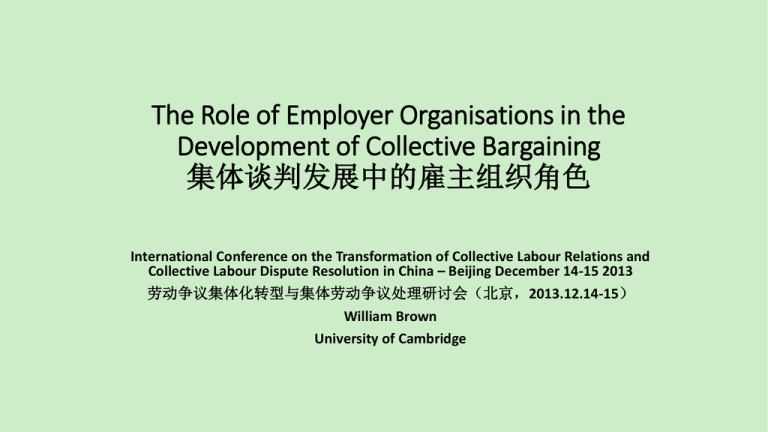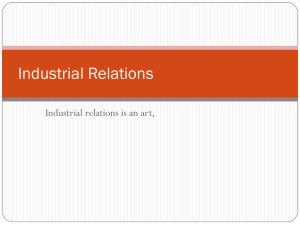The Role of Employer Organisations in the Development of
advertisement

The Role of Employer Organisations in the Development of Collective Bargaining 集体谈判发展中的雇主组织角色 International Conference on the Transformation of Collective Labour Relations and Collective Labour Dispute Resolution in China – Beijing December 14-15 2013 劳动争议集体化转型与集体劳动争议处理研讨会(北京,2013.12.14-15) William Brown University of Cambridge The implications of China’s commitment to sectoral collective bargaining for employer organisation – the experience of other countries 中国致力于行业集体谈判对雇主组织的影响:其他国家经验 • • • • • • • • • • • • Theoretical issues raised by sectoral bargaining 行业集体谈判引发的理论问题 The emergence of employer organisations in the West 西方雇主组织的产生 Sectoral bargaining and market and managerial control 行业集体谈判与市场和管理控制 Sectoral bargaining and the state 行业集体谈判与国家 The emergence of employer organisation in China – 3 cases 中国雇主组织的产生——三个案例 Conclusion 结论 Theoretical issues raised by sectoral bargaining 行业集体谈判引发的理论问题 Why does it make sense for employers to collude over labour when they compete in their product markets? 在产品市场竞争中,为什么雇主在劳动力方面相互联合是有意义的? •All markets operate within constructed boundaries and constraints •所有的市场都在建好的边界内和约束条件中运行 •The rules defining and constraining markets are contested by those engaged in them •市场参与者质疑定义和约束市场的规则 •Product markets are all to some extent imperfect and thereby generate excess profits •产品市场在某种程度上都不是完美的,因此产生了超额利润 •Collective bargaining is concerned with gaining a share of the profits for the workers •集体谈判关心的是工人获得的利润份额 •The regulation of a market may inhibit damaging short-term opportunism •市场监管可以抑制有害的短期机会主义 •Relative wage stability influences labour productivity •相对工资稳定影响劳动生产率 The emergence of employer organisation 雇主组织的产生 •Employers have colluded with each other over the price of labour since the Industrial Revolution •从产业革命开始,雇主在劳动力价格方面就已经相互联合了 •In Britain, employer regulation of pay preceded trade unions in early 19th Century •在19世纪早期的英国,雇主在工资方面的规定早于工会 •As trade unions developed, employer associations developed •当工会变得发达,雇主组织也变得发达 •Sectoral (also known as ‘multi-employer’ or ‘industrial’) bargaining started on a local scale •行业(也被认为“多雇主”或“产业”)集体谈判起始于一种局部的规模 •By 1914, employer associations were taking initiative in national wage regulation and disputes procedures 到1914年,雇主组织在国家工资规定和争议处理程序方面取得主动权 •In USA, in 1904, John Commons identified three conditions for successful sectoral CB: •1904年,美国的John Commons 认为成功的行业集体谈判具备三个条件: • Strong organisations on each side willing to negotiate双方强有力的组织愿意协商 • Agreement that wages should be the same for unionised and non-unionised workers 达成工会和非工会成员的工资 是相同的协议 • A disputes procedure jointly managed by unions and employers 工会和雇主共同管理争议处理过程 Market control and managerial control 市场控制和管理控制 • • • • • • Sectoral CB serves two different employer interests – market control and managerial control 行业集体谈判服务于两种不同雇主利益——市场控制和管理控制 Market control reduces uncertainty of pay and labour costs – ‘taking wages out of competition’ 市场控制减少工资的不确定性和劳工成本——让工资远离竞争 Managerial control gained because sectoral CB: 行业集体谈判产生管理控制: • Legitimises pay scales, providing a stable base for management of labour • 支付范围合法化,为劳工管理的提供稳定的基础 • Prevents unions from picking off firms separately • 阻止工会分别挑选公司 • Minimises influence of unions at the workplace – employers keep control of work organisation • 工会在工作场所的影响最小化——雇主保持对工作组织的控制 • Provides a means of resolving disputes with joint, independent mediation • 以联合、独立的仲裁作为解决争议的一种途径 • Gives a strong basis for encouraging and enforcing skills training • 为支持和加强技能培训提供强有力的基础 Sectoral bargaining and the state 行业集体谈判和国家 •Sectoral CB was at its peak in mid 20th C – but by the end of 20th C, though strong in continental Europe, it had collapsed in US, UK, Japan, Australia, Canada etc – Why? •行业集体谈判在20世纪达到顶峰——但是在20世纪末,尽管在欧洲大陆依然强盛,但是在美国、英国、日本、澳 大利亚、加拿大等国处于低谷——原因何在? •Benefit of sectoral CB to employers is in defining what unions can not bargain over (Sisson) •行业集体谈判对雇主有利的是界定在什么情况下工会不能进行集体谈判(Sisson) •Scope of employer response to unions is constrained by national legal structures – how far they provide union recognition rights and support sectoral bargaining •国家法律体系限制了雇主回应工会的范围——工会被认可的权利范围以及雇主支持行业集体谈判的程度 •Origins of legal structures in particular crises when the state intervened with legislation •政府通过立法干预一些特定危机,因此形成了相应的法律结构渊源 •Shaped by the nature of the country’s crisis (recovery from war, strikes, depression) 受国家危机的类型的影响(从战争、罢工、衰退中复苏) •Also shaped by political influence of unions, and large employers, and Marxism, and protectionism •也受到工会的政治影响力、大型雇主、马克思主义和保护主义的影响 •Two key legal provisions reinforced sectoral CB in Europe: •两个关键的法律规定强化了欧洲的行业集体谈判: • ‘Peace obligation’ preventing action against the agreement“ 和平义务”防止反对协议的行为 • The extension of collective agreements to all employees 集体协议扩展到所有员工 How can sectoral CB survive under globalised competition? 行业集体谈判在全球化竞争下的如何生存? • In countries here both sectoral CB and enterprise CB collapsed, it did as a result of competitive pressure • 由于竞争的压力,一些国家行业集体谈判和企业集体谈判都陷入衰退。 • Employer associations generally collapsed with sectoral CB • 通常情况下,雇主组织和行业集体谈判一起陷入衰退。 • Despite the same competitive pressures, in Europe sectoral CB has adapted and continues for most of EU-15 countries – Why? • 尽管面临相同的竞争压力,在欧盟15国大多数国家中,欧洲的行业集体谈判却能够适应和持续, 原因何在? • Attributed by Marginson and Sisson to the attraction to employers of (a) the ‘peace obligation’ and (b) the restriction of workplace union involvement by sectoral CB • Marginson和Sisson的研究关注雇主(a)和平义务和(b)工会通过行业集体谈判进入限定的工作场所 • Sectoral agreements in EU are weaker, but ‘social partnership’ involves employer associations and unions in (i) macro-economic stability negotiations and (ii) the adjustment of sectors to structural change • 欧洲的行业集体合同力量较弱,但在(i)宏观经济稳定协商(ii)行业结构变化的调整方面,“社会参与”涉及雇主组织 和工会 The development of employer organisation in China 中国雇主协会的发展 • China Enterprise Confederation lacked decentralised presence, but All China Federation of Industry and Commerce has local organisation – in 2008 industrial relations added to its mandate; in 2010 it became involved in tripartite consultation • 中国企业联合会过于集中,但中华全国工商联合会有地方性机构——2008年将产业关系加进其职责;2010年 成为三方协商三方之一 • Local employer organisation emerged in Zheijiang and Jiangsu and moved into labour issues • 地方性雇主组织出现在浙江和江苏,并转入劳工问题 • Three case studies: i) Wenling woollen garments, ii) Yixing ceramics, iii) Pizhou plywood • 三个案例:1、温岭羊毛服装;2、宜兴陶瓷;3、邳州胶合板 • Employers first became organised to stabilise disorderly labour market • 雇主在稳定无序的劳动力市场方面首次变得有组织性 • Trade union became involved in setting up negotiations, and in mediating outcome • 工会参与集体协商,并调节其结果 • Local government gave strong support • 当地政府强有力的支持 • Resulting sectoral agreements appear to be successful and reflect different concerns of employers and workers • 行业集体合同的结果似乎是成功的,反映了雇主和工人不同的关注点 • Two-tier bargaining reflects different profitability within sectors • 双层谈判反映了不同行业的盈利能力 What are the lessons from other countries’ experience? 其他国家的经验教训是什么? • Sectoral bargaining can provide a stable and competitive basis for industrial relations • 行业集体谈判能为产业关系提供一个稳定和竞争的基础 • It is the main function of employer associations • 这是雇主组织的主要功能 • Protects employers’ managerial authority • 保护雇主的管理权威 • Provides trade unions with strong recognition rights • 为工会提供强有力的被承认的权利 • Encourages egalitarian outcomes and effective minimum wages • 鼓励结果公平和有效的最低工资 • Provides a means for wider involvement of employers and unions in economic policy • 在经济政策领域为雇主和工会的广泛参与提供了一种途径 • Sectoral bargaining is vulnerable to competitive pressures unless:行业集体谈判面对竞争压力是脆弱的,除非: • Supported by government 得到政府的支持 • Legal enforcement of a ‘peace obligation’ not to use action to break agreements • “和平义务”法律实施:不能用行动破坏协议 • Legal application of the terms of agreements to all workers in the sector as minima • 协议条款的法律适用范围最低限为行业的所有员工 • Agreements should permit some employers freedom to provide improvements • 协议应该允许一些雇主可以自由进行改进 • Part of a wider system of employer and union involvement in sectoral industrial regulation • 作为更广泛系统的一部分,雇主和工会参加行业中的产业规制 Main references 主要参考文献 • Clegg, H. A. (1976), Trade Unions under Collective Bargaining, Oxford: Blackwell • Commons, J. R. (1914), Labor and Administration, 1964 reprint New York: Keller • Flanders A. (1974), Management and Unions: the Theory and Reform of Industrial Relations, London: Faber • Gospel, H. F. (1992), Markets, Firms, and the Management of Labour in Modern Britain, Cambridge: CUP • Marginson, P. and Sisson, K. (2004), European Integration and Industrial Relations, Basingstoke: Palgrave Macmillan • Sisson, K. (1987), The Management of Collective Bargaining, Oxford: Blackwell







